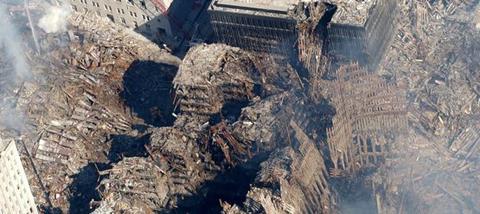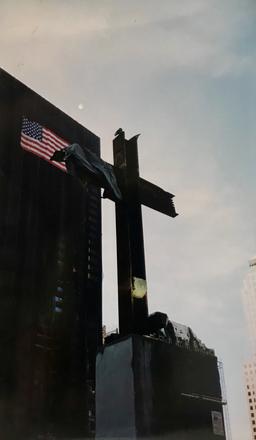When Lisa-Jayne Lewis went to America to be a youth pastor with The Salvation Army she never imagined she would be walking through the rubble of the World Trade Center, supporting grieving families who had just lost loved ones. She explains what she learned from her harrowing experience

Everybody remembers where they were when they heard the news about 9/11. It was the day that changed many lives forever, mine included...
I was just 22 when I left Guildford and moved to the USA to work for The Salvation Army as a youth pastor in Dorchester, Massachusetts. I wanted to use my gifts, skills and faith to make a difference to vulnerable children and young people. Just four months into that role, I was asked to be part of a team who would head to New York City and handle some of the logistics in the recovery operation at the World Trade Center (WTC) following the attack.
Upon arrival at the Salvation Army’s HQ we were assigned our roles. In the general kafuffle I could hear someone saying we would be the chaplains. “What?!” I thought, internally. We had been told that we’d most likely be ‘back-of-house’. I was prepared to stock coffee stations or maybe do some paperwork, but (despite being told this was a possibility) I hadn't seriously considered the idea I might be asked to work on the site itself. All of a sudden we were being issued with hard hats, chaplain jackets and ID badges with access to all areas and being briefed on what the role would entail.
I learned many lessons during this time, some relating to my own character and personality, others about faith and God, and still others about the diverse responses to human tragedy. Here are four of them.
1. Dignity and respect are paramount
You can learn about disaster relief, chaplaincy work and take part in drills, but there is no training in the world that could have prepared anyone for what they would face at the WTC. Yet every task was worked out under the umbrella of dignity and respect. When remains were discovered all work stopped on site. The job of the chaplains was to go and say a short prayer over that person - a fairly generic one out of respect for people of all faiths and none who lost their lives in that building. The chaplain then led the recovered remains, now held in a body bag, up the ramp to the waiting personnel at the top. All the other workers formed a guard of honour up the ramp and, sometimes if the person could be identified, their family may have been invited on site to witness the recovery. Chaplains would be with the family during this time.
The remains would later be taken to the morgue in midtown, and as the vehicle drove off the site, work began again slowly, until more remains were found and the ritual repeated. The recovery operation probably took a little longer because of this, but we were not on a timer. That is an important lesson I learned, that dignity and respect are more important than hurrying through tasks in order to get them finished.
2. The desire to reach out is strong
One of the first things I noticed when I walked into the on-site command centre (a big white tent known as the ‘Taj Mahal’) was the sheer volume of cards, drawings, letters and artwork that had been sent to the site from all over the US and the world. One card had a child’s drawing of a fire engine and two fire-fighters. Inside it said: “I am thinking of yuo [sic], from Bethany, age 5, Phoenix, Arizona”. As I picked up the others on the table they too had come, seemingly, from a class of children in Phoenix and all had pictures of the towers or fire-fighters on the front.
So many people wanted to reach out to the personnel serving on site. For some it meant letters and cards, for others in meant donating clothes or accommodation. In a world that is so fragmented and so divided, the natural human desire to reach out and share a kind word, even to people we don’t know, is heartwarming. When humanity is hurting we are all able to do something about it, if we choose to.
3. Self-care is critical
We have developed a greater understanding of the importance of self-care in recent years, but as far as most of us on site were concerned, we were there to do a job and looking after our own needs was not a priority.
The City of New York Government famously made mistakes in providing workers with face masks. Our team simply didn’t have enough, which meant many of us were inhaling harmful toxins and chemicals. I now have suspected asbestos in my lungs and many others have had cancer diagnoses as a result. But none of us were thinking about the potential harm we might be doing to ourselves, all of us just wanted to be on site doing whatever we could to help.
Many people, myself included, developed PTSD as a result of working on the site. When people have experienced something traumatic we absolutely must give them the time and space to process that and allow them to do it in a way that feels right for them. I am a verbal processor; I need to talk things through, but I was not really given the opportunity to do this. We did have a short debriefing session once we were back in Boston, which was helpful, and I was told to pray about it, but we were all advised not talk about it too much as it might frighten people who weren’t there.
Given the way I was thrust into the role, and the subsequent health problems I’ve had, I can understand why some might be critical of how The Salvation Army handled our situation. But at the end of the day, I committed myself to my role as night-shift chaplain and I don’t regret a single moment of my time there. With hindsight, of course more help probably should have been given, or at least offered, to those of us who had worked on the site, but at the time there was a constant stream of personnel going in and out of the site, and managing that required some extra special logistical gymnastics. We must also remember that understanding and education around mental health issues then were not what they are today. Thankfully, things have moved on a lot in the rhetoric around mental health in the past 18 years, both in the world in general and in The Salvation Army’s Disaster Relief Management.
4. Language is important
Rescue and recovery workers seldom use the words 'Ground Zero'. It was something to do with the term 'Ground Zero' originating from the world of nuclear explosions. To be honest I didn’t quite get it, but I knew that it bothered a lot of the people working there so I (and everyone else on site) didn’t use it.
It doesn’t matter if we don’t fully understand the reasons behind something, but it does matter if we continue to use words that aren’t helpful to the people we are talking to. We must learn the correct language and use it. If we get it wrong we must apologise and move on.
The aftermath
Despite the seriousness of the situation, there were moments which were more lighthearted. I have fond memories of peanut M&M battles, marker pen fights and patching up one of the tents using my campcraft skills learnt at Guides a decade earlier. One particularly senior worker accidentally sprinkled sugar on their fries instead of salt. Another person found a completely undamaged bag of mini-marshmallows buried in the wreckage of the south tower.
I’ve pretty much got a handle on my PTSD now. Some healing has taken place, although I think it will always be a part of me, and to be honest, I am ok with that. It is ultimately a part of me and my story. I know my triggers and I still can’t watch anything about the day itself and tend to steer clear of social media on anniversaries.
I still struggle with my lungs from time to time, especially if I catch a cold, but generally my health is good. I certainly harbor no ill-feelings towards anyone in The Salvation Army or the situation in which I found myself, in fact quite the opposite. I am humbled and amazed that God chose to use an ordinary someone like me in this extraordinary situation.
Some lost their faith after working gruelling shifts at the WTC, but mine got stronger. As a result of my work there I sensed a calling to full-time ordained ministry and, although I’ve left that behind me now, I went on to be ordained and commissioned as a Captain in The Salvation Army in June 2005. One of my first assignments after ordination was the Gulf Coast Management Team in Mississippi following the devastation of Hurricane Katrina. When I see disasters on the TV, like Hurricane Dorian that has just battered The Bahamas, I pray for those going to work and serve there because I know some of the experiences that they are likely to have and how much they will need God’s love, peace and guidance; perhaps you could join me in praying for them too.

































No comments yet